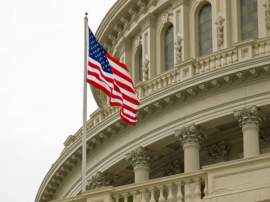
Article 4

Popular In Constitution
Purpose Of Lifetime Appointment And Pros And Cons Enumerated Powers Bicameral Legislature Background Article 3 Of The Constitution We The People 1st Amendment Who Wrote The Constitution Judicial Review Equal Protection Clause 5th Amendment 10th Amendment Three Fifths Compromise
The history behind article 4 of the Constitution is comprised of the area of private law. In more specific terms, it is composed of that which is set forth from the guidelines of both jurists as well as court decisions in relation to their jurisdictions. In such cases where this local set of policies is not existent, individuals will still be subject to the laws of alternate jurisdiction. Examples of this include the recognition of marriage as well as that of legally binding contracts. Due to belief that such areas of The history behind Article 4 of the Constitution is comprised of the area of private law. In more specific terms, it is composed of that which is set forth from the guidelines of both jurists as well as court decisions in relation to their jurisdictions. In such cases where this local set of policies is not existent, individuals will still be subject to the laws of alternate jurisdiction.
Examples of this include the recognition of marriage as well as that of legally binding contracts. Due to belief that such areas of private law necessitated increased observance, individuals sought for it to be placed within the Constitution to ensure its upholding on higher levels of Federal law.
Article 4 in most cases has functioned in direct
connection to that of judgments. Two specific areas of judgment include the
enforcement of a case in a locale other than where the original legal
proceedings had stemmed, as well as when a new suit is taken from that of a
previous one. A case which set the stage for future applications of Article 4 in
the Constitution was that of Mills v. Duryee.
Taking place in 1813, this case brought forth an action within the District of Columbia stemming from a judgment incurred within a New York State court. In such a case, the defendant had desired to reopen inquiries on that of the merits of their prior case by imposing a plea of "nil debet." This term entails that of debt in connection to a contract of some sort. The Court decided that the Constitution did not operate with the express purpose of restating common law, but actually with the desire to strengthen and make known the existence of judgments in other locales.
Later in Hampton
v. McConnell Chief Justice Marshall went further to state his belief that State
courts recognize each other's judgments so as to enforce and validate final
judgments in accordance with each other.
A subsequent case that dealt with Article 4 of the
Constitution was that of McElmoyle v. Cohen. The issue that resided within this
case was whether the statute of limitations of Georgia would maintain authority
to ban actions within that State based upon the judgment attained within a
South Carolina Court.
Article 4, in most cases, has functioned in direct connection to that of judgments. Two specific areas of judgment include that of which involves the enforcement of a case in a locale other than where the original legal proceedings had stemmed as well as when a new suit is taken from that of a previous one. A case which set the stage for future applications of article 4 in the Constitution was that of "Mills v. Duryee." Taking place in 1813, this case brought forth action within the District of Columbia that which stemmed from judgment incurred within a New York state court. In such a case, the defendant had desired to reopen inquiries on that of the merits of their prior case by imposing a plea of "nil debet." This term entails that of debt in connection to a contract of some sort. The court decided that the Constitution did not operate with the express purpose of restating common law, but actually with the desire to strengthen and make known the existence of judgments in other locales. Later, in "Hampton v. McConnell," Chief Justice Marshall went further to state his belief that state courts recognize each other's judgments so as to enforce and validate final judgments in accordance with each other.
A subsequent case that dealt with article 4 of the Constitution was that of "McElmoyle v. Cohen." The issue that resided within this case was whether the statute of limitations of Georgia would maintain authority to ban actions within that state based upon the judgment attained within a South Carolina Court. In contrast to that of Chief Justice Marshall's sentiments, the court ruled that the Constitution did not maintain the authority to interfere with the elements of "lex fori" or in "conflict of laws," that which specifies a courts governance over alternative areas of jurisdiction. Therefore, it was decided that foreign judgments not assume the power they once had in other locales so as to maintain the integrity of local legislation. In this way, the court of judgment is entitled to the possession of "full faith and credit
NEXT: What Is Federal Property




















